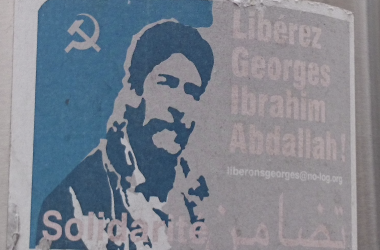Historiography and Armed Struggle
Ron Augustin
(Talk at the University of Amsterdam, June 2016)
In every epoch, the attempt must be made to deliver tradition anew from the conformism which is on the point of overwhelming it.
—Walter Benjamin
The RAF’s history spans a period of thirty years. There are countless possible ways of presenting the RAF and this period, and in principle I wouldn’t question the legitimacy of any of them (as long as they are not purposely conceived as a weapon in the struggle to establish authority over interpretation). That said, I think that, at the end of the day, all of these accounts can be traced back to one of two approaches.
The first is a rather distant one, expressing loyalty to and identification with the status quo. One way or another, it serves to justify a certain degree of conformity and is distinguished by sensationalism, voyeurism, sex & crime, and superficiality, all of which are divorced from the real political context.
The other approach, which in whatever way is concerned with context and authenticity, comes from an interest to learn. Not necessarily out of some identification, but it nonetheless comes from a more or less concrete interest in social change, as long as it is not just concerned with defending one’s own position against a perceived opposing one. I’d say somehow from a position of resistance – even if it reflects a completely different development from our own.
Of course, the first approach predominates in official historiography and mainstream journalism, but one of the problems with the way our history is addressed is that even accounts grounded in the second approach often incorporate suppositions which have been taken from the mainstream. One might say that in times of political and intellectual regression, the mainstream is the official arbiter of interpretation – as long as it is not challenged.
Before the group had even given itself a name, it was branded “Baader-Meinhof,” setting in motion the construction of a myth that had nothing to do with the political background and context of armed struggle, reducing the issue to some of the individuals involved. That’s been the formula ever since the Paris Commune in 1871: personalization and individualization as a means for depoliticizing. Depoliticizing means: depriving something of its edge, i.e., of its contents and its substance.
The picture persistently put forth is that of a group that was organized as some sort of a hierarchical cadre party, with people in command and people following orders, supplemented with fairytales about specific individuals. The general idea is that there would not have been any armed struggle here without the special relationship between Andreas Baader, Gudrun Ensslin, and Ulrike Meinhof.
In addition, the political background is developed in a limited and mechanical way based on the chronology of the student movement – mostly driven by a spiral of violence, in which the police and demonstrators mutually stepped up the level of confrontation, resulting in the radicalization of the individuals involved.
Hence, a purported spiral of violence and the psychology of some people make up the cocktail that supposedly explains this chapter of history. The interesting thing is that these accounts are largely based on exaggerations, distortions, falsifications, and disparaging prattle, hardly on facts or the mere attempt to search these out. This way, a historical process is turned into a (negative) icon. The result is that every reference becomes a reference not to real facts but to something some historian or journalist cooked up on their own – or picked up from their colleagues.
Until some fifty years ago, anyone who wanted to be considered an historian had to present and publish a number of works in academic circles. Today, any historian who fails to maintain a presence on the Internet and in the media is considered irrelevant. That perhaps signifies a certain opening and democratization of the academic world, but it also implies the requirement to market oneself, to remain in the market, i.e., the book market, Wikipedia, the media in general.
At any rate, in “official” historiography, this blurs the line between academic research and journalism, and that means an ever-increasing dependence on the media and their communication strategies, in terms of shaping opinion, predefined wording, scoops, market segmentation, time-to-market, etc.
What’s typical of how the media function, for instance, is that a journalist launches an assertion, which is subsequently taken up without question by hundreds of others. In the rare cases where a source is mentioned, it will be the initial journalist. In this way, assertions are continuously repeated, without ever being verified.
What this means for the history of the RAF is that apart from some autobiographies and the like, there is no comprehensive account of the origin, development and policy of the group . There are hundreds of books and documentaries about the RAF that all repeat the same suppositions, insinuations and myths, primarily based on intelligence and police files. And whenever something new comes up, it follows the same biased routine, with assumptions that are often simply made up. (An exception in English: André Moncourt, J. Smith, The Red Army Faction: A Documentary History, Kersplebedeb and PM Press. Vol. 1, 2009: 1970-1977. Vol. 2, 2013: 1977-1984. Vol. 3, 2017: 1984-1998.)
I could come up with hundreds of examples, but I think it’s more relevant to understand where these stereotypes regarding the RAF come from and what the sources are that are considered official historiography.
To this end, three names must be mentioned: Stefan Aust, Wolfgang Kraushaar, Gerd Koenen.
First, Stefan Aust, who is the most quoted and considered a “RAF expert.” Among his fellow journalists, Aust is considered controversial, one reason being his murky methods of acquiring information. His credibility is entirely based on the claim that he knew Ulrike Meinhof personally. It is true that he worked at konkret in his early twenties, at a time that this monthly degenerated from being a voice of the student movement into a soft porn magazine, and when Ulrike was about to step down as editor-in-chief and leave the enterprise. He became friends with Ulrike’s ex, Klaus-Rainer Röhl, and that is exactly where the clichés come from that have been used until today.
Immediately after Ulrike went underground, it was the clique around Röhl who started to spread stories based on the alleged psychopathology of individual people. The BKA’s Alfred Klaus, who would subsequently be present during family visits in prison, used these stories to put together the so-called “psychograms” that ended up being used at the trials and in the media. As an essential aspect of the psychological war, and in the best tradition of the Nazi Reichssicherheitshauptamt’s “Gegnerforschung” (Enemy Research) department.
Aust’s flagship production, The Baader-Meinhof Complex, is a hefty 800-page tome, written in the style of a thriller. There is not one source reference in the entire book. Even alleged verbatim quotes are not accompanied by any verifiable reference. Aust owes both the contents and the title of his piece of work to the BKA: the BKA used to file all its documents related to the hunt for the RAF under the name Baader-Meinhof Komplex. The BKA allowed him access to the 250 files (around 120,000 pages) that, at the time, were only available to court participants – i.e., illegally.
His partisan claims are not based on verifiable facts, but largely on fabrications, falsifications, and lies. Typically, when he quotes us, the quote is torn out of context and flipped on its head. One example among many: he quotes a note written by Ulrike, in which she said something about how encouraging the actions of the student movement were – he turned “encouraging” into “discouraging” to suggest the exact opposite meaning.
Although he doesn’t provide any source references in his book, he is the most quoted source reference in anything purporting to be a serious account of the RAF’s history.
Wolfgang Kraushaar styles himself a political scientist, but for a long time had a bad name among academics, because he didn’t produce anything but chronicles: chronological data collections devoid of analysis. As chance would have it, he had the opportunity to work with the normally restricted Reemtsma Institute archives, assisted by interns and students. Ever since, he has produced volume after volume in the service of both his own fame and a witch-hunt. An archivist playing cop. It all has more than a little to do with personal survival strategies in a time of chronic unemployment.
Gerd Koenen, who was a Stalinist Maoist for years, and who has been busy for some time now vilifying his own history, makes a living by writing cynical stories that are meant to prove that the 1960s left was off its nut. He doesn’t have much to say about us, but instead focuses on personalizing the prehistory of the RAF, or, as he likes to call it, the RAF’s “infernal limbo.” Like many other authors, he makes reference to things that happened way before the RAF came into existence, paying no attention at all to the subsequent development of the people in question. One example of his falsifications: in a letter, Gudrun Ensslin made an ironic reference to a newspaper clipping that used the word “crazy” to describe anything socially unconventional. Koenen transforms the quote into “an element of madness” in the struggle against capitalism, suggesting that it was something that Gudrun herself had said. It’s both banal and stupid, but all that matters is that it sticks.
As I said before, others build upon this sort of thing, and at some point it becomes difficult to tell where the story actually originated. That’s the method. Virtually all other RAF biographers are journalists caught in a chain of dependency within an ultimately homogenous market, where any nuances are based on whether they publish in the tabloids or appear in the so-called “leading media”, i.e., the newspapers and TV programs that are viewed as authoritative.
We have no problem being criticized – as long as it is based on facts and not just the same old baseless misrepresentations. Brecht’s The Decision and Melville’s Moby-Dick, which were mentioned once or twice in an offhand manner in our prison correspondence, continue to be held up as key to understanding the RAF, even though none of us ever picked up on them again. I don’t mind when they are used as metaphors for telling a story. It’s an angle. But, for one thing, it’s pretty ridiculous to derive, as Aust does, an enduring and serious theory out of this (without even noticing the fact that Moby-Dick was written as an anti-capitalist critique), and, second, it’s just boring when one scribbler after another tells the exact same story – apparently no one has been able to come up with another angle anymore.
A halfway authentic account of our history is still lacking. Of course, we bear some responsibility for that. Original documents, including strategy papers, statements, and parts of our discussions are available (in German at socialhistoryportal.org/raf; in English at germanguerilla.com), but over time many of these have become dated – they have to be placed in their historical context, and we ourselves have as yet failed to create a written record of this.
History is made by people. I don’t deny that individual initiatives and personalities can be decisive in historical processes. I’m just saying that the RAF didn’t arise simply because one or another person drew a conclusion from what was going on, but that its emergence was the result of objective dynamics that must be understood in a dialectical relationship with the transformation processes within the capitalist system at the time. Dynamics that gave rise to armed groups in practically all of the capitalist centers, and within which these groups and the state machineries fighting them related to each other in specific ways at given moments.
In my view, a realistic assessment of the RAF’s history is not possible without an equally realistic appraisal of capitalist development during the second half of the last century, and this analysis would have to deal with how we can find a way out of capitalism. I’m not saying that the RAF and its praxis point the way. All I’m talking about here is how history is written. My point is that the context, or the interconnection among things, is often more important than some particular event.
The emergence of the RAF cannot be explained by a mere sequence of particular events during the 1960s uprisings. I place the group’s development over time within dynamics rooted in the immediate post-World War II period, i.e., within the international balance of power established at the time and the resulting transformation processes. I can only present the broad strokes here: the development of liberation movements during the years of decolonization, the Non-Aligned Movement, splits within the communist parties, new forms of organization, the question of how to divide the imperialist forces and overcome the weakness of the left in the capitalist centers, and at the same time the third industrial revolution, and so on.
We assumed that we could be a political-military factor within this balance of power, and that we could contribute to getting revolutionary consciousness up on its feet again in the capitalist centers this way. For us, this was also an existential process.
Years of discussions and experiences preceded the formation of the RAF, discussions and experiences that took different forms in different places, but which nonetheless led to similar conclusions and decisions in these different places. For myself, for example, there was no precise moment when this occurred; it was a process that took years.
Violence was a secondary consideration in this development; its sole purpose was to break through the state’s monopoly of violence and develop a counterbalance to the system’s violence. What was actually important to us was to hold on to the essence of the student movement and to continue to develop revolutionary politics, with the underground as a precondition for organizing practical resistance without being watched by the police and infiltrators every time you made a move or prepared to do something. What was at issue was creating a basis for ongoing and effective resistance against the system. The underground as a “liberated zone”, as the necessary terrain from which the struggle could be developed further. There were several groups of people thinking this way, organizing themselves, and trying to ensure their freedom of movement and their capacity to act, as part of something larger.
So, not directly aimed at a mass base, but toward sustaining the initiative and creating new political possibilities for the left. Of course, with a broader perspective, but, above all, it was a matter of the concrete situation giving rise to a possibility. It was not yet a revolutionary situation, but the conditions created the opportunity for the left to tear a piece of ground out from under imperialism, to oppose its restructuring efforts – efforts which, after the collapse of the Soviet Union, paid off in the form of so-called “neoliberalism.” That was perhaps inevitable, but in my view, the left could have developed a more significant counterbalance – at any rate, that’s what we as the RAF, together with others, were trying to do.
Armed struggle, the urban guerilla, has not gotten beyond the experimental stage here. We made mistakes, but I think that the urban guerilla as a praxis was necessary, as an attempt. The RAF redefined notions like collectivity, clandestinity, revolutionary subjectivity, revolutionary class. Not as blueprints for the future, but perhaps leaving traces – which possibly, at some point, people may or can reappropriate once again.



